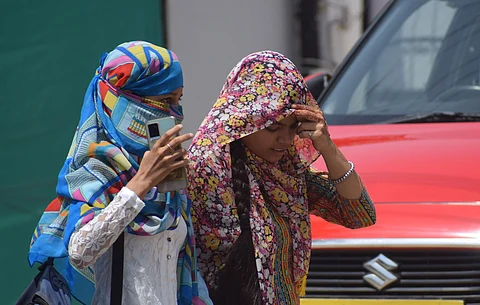
- Destinations
- Experiences
- Stay
- What's new
- Celebrating People
- Responsible Tourism
- CampaignsCampaigns
- SubscribeSubscribe
- Buy Now

The India Meteorological Department (IMD) recently issued a ‘yellow alert’ for several parts of North India, and has even issued heatwave warning for Northern and Central India. In fact, yellow alerts have been issued at Uttar Pradesh, Madhya Pradesh, Rajasthan, and Haryana; while areas such as Gujarat, Tamil Nadu, Madhya Pradesh, and Maharashtra are likely to experience hot and humid conditions till April 25.
But this isn't new. In the past few years as global temperatures continue to climb, heatwaves have only risen to become more severe and lethal each year. With global average temperatures rising 1.28 degrees over the 20th-century baseline in 2024, Earth had its hottest year on record, breaking the previous record set in 2023. Particularly in India, this heat was unheard of; in places like Delhi, temperatures reached 52.3 degrees, the highest level in 74 years. These harsh circumstances have resulted in serious health hazards, problems with the infrastructure, and financial losses.
A lengthy stretch of unusually hot weather, sometimes with considerable humidity, is normally quipped as a heatwave. When the highest temperature in India surpasses 40 degrees in the plains, 37 sticky degrees along the coast, and 30 degrees in the hills—as long as it is at least 4.5 degrees higher than the average, the India Meteorological Department (IMD) declares a heatwave.
Health Risks: Heat exhaustion, heatstroke, dehydration, and the aggravation of pre-existing medical disorders are among the serious health hazards associated with heatwaves. Over 700 heat-related deaths were reported in India in 2024; however, some estimates indicate that the number may be greater because of underreporting.
Agricultural Losses: Extreme heat adversely affects crop yields, leading to food insecurity. In 2024, over 3.2 million hectares of crops were damaged in India due to heatwaves.
Infrastructure Strain: High temperatures increase energy demand for cooling, leading to power outages and stressing the electrical grid. In urban areas, the heat island effect exacerbates the situation, making cities significantly hotter than surrounding rural areas.
In a time of illimitable climate crisis, heatwaves are not confined to India; they are a global concern. In June 2024, nearly five billion people worldwide endured unprecedented extreme heat, affecting 60 percent of the global population. Countries like Mexico experienced temperatures reaching 52 degrees, resulting in at least 125 deaths. These events underscore the urgent need for global climate action.
Stay Hydrated: Drink plenty of water regularly, even if you do not feel thirsty. Avoid drinks with caffeine or alcohol, as they can dehydrate you.
Limit Sun Exposure: Avoid going out during peak heat hours, typically between 12:00 PM and 3:00 PM. If necessary, wear a wide-brimmed hat, sunglasses, and use sunscreen.
Wear Appropriate Clothing: Opt for lightweight, light-coloured, and loose-fitting clothing to help your body stay cool.
Keep Your Home Cool: Use curtains or blinds to block direct sunlight. Utilise fans, coolers, or air conditioning if available. Ensure proper ventilation to allow hot air to escape.
Check on Vulnerable Individuals: Regularly monitor children, the elderly, and those with chronic illnesses, as they are more susceptible to heat-related illnesses.
Although for the most part the government has resolved to quick-fixes when tackling heat waves and other climate crises, the National Disaster Management Authority (NDMA) in India has issued guidelines to mitigate the impact of heatwaves. These include public advisories, early warning systems, and promoting heat action plans at the state and city levels. These measures aim to enhance preparedness and response to heat-related emergencies.
While individual precautions are vital, collective action along with pragmatic approach and robust policies are essential to combat the escalating threat of extreme heat. Staying informed, prepared, and proactive can significantly reduce the risks associated with heatwaves.
